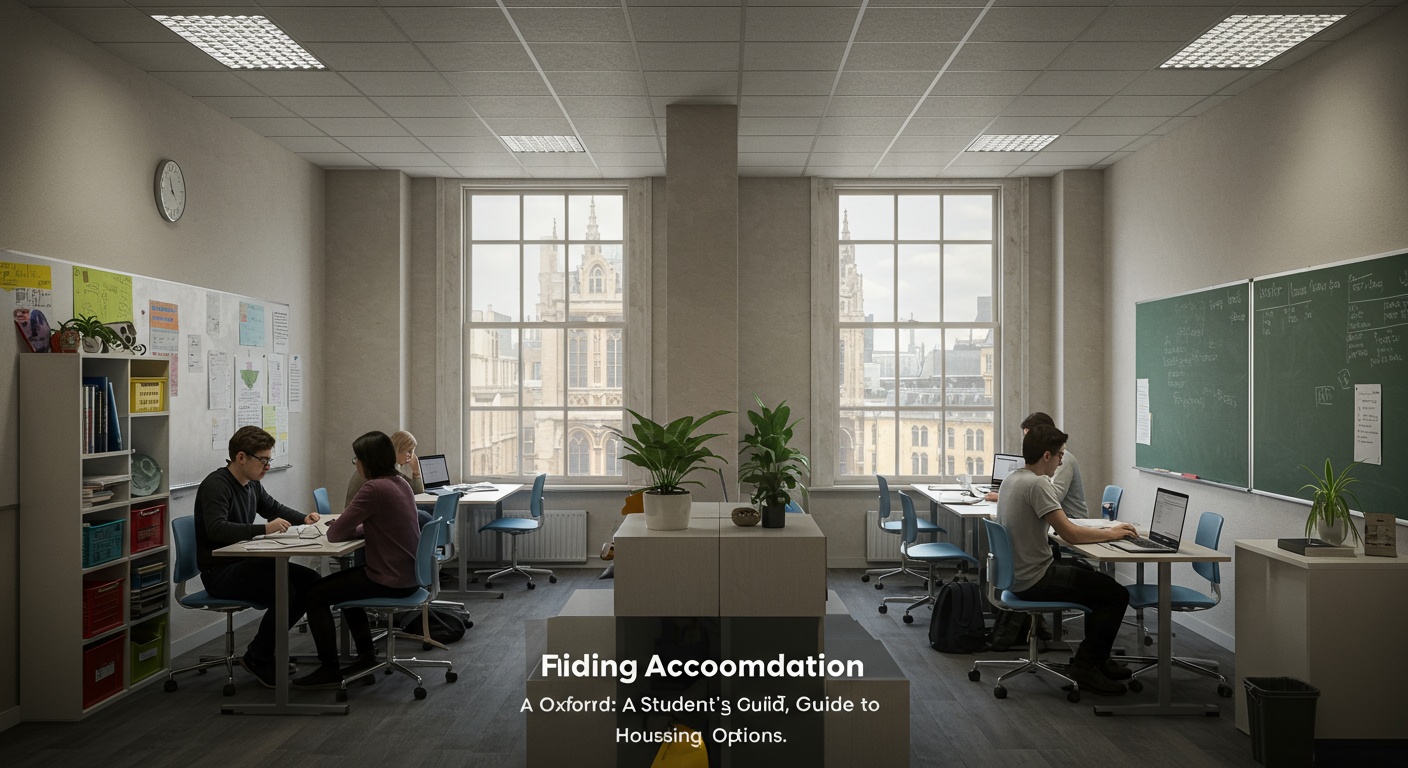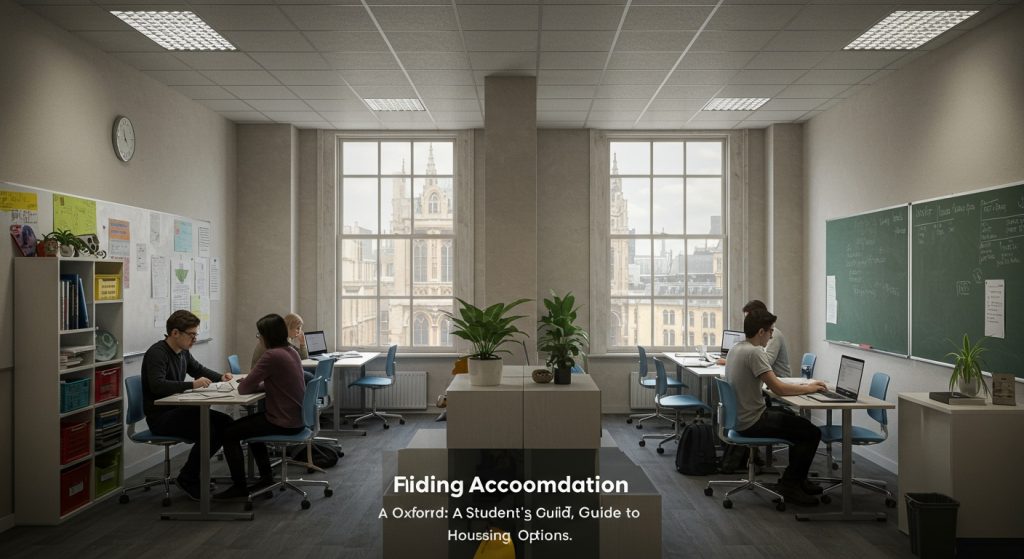Securing accommodation at Oxford is more than just finding a room; it’s about finding your place in a vibrant, historic ecosystem. Forget generic student halls – picture yourself in a centuries-old college, or perhaps a modern apartment near the bustling Cowley Road. Recent surges in private rental costs, coupled with increased demand, mean early planning is essential. Understanding your college’s accommodation policy is key, as offerings vary considerably, from en-suite rooms at St. Antony’s to shared facilities at Oriel. Explore the graduate accommodation lottery system and consider the often-overlooked advantages of living in a college annex further from the city center. Make informed decisions and navigate the options to find your ideal Oxford home.

Decoding Oxford’s Accommodation Landscape
Securing accommodation at Oxford University is a crucial step in preparing for your academic journey. Unlike some universities, Oxford operates a college system, which significantly impacts your housing options. Each college is a self-governing institution that provides accommodation primarily for its own students. This means understanding the college system is key to navigating your housing search.
The accommodation year typically aligns with the academic year, running from late September/early October to late June/early July. Contracts are usually fixed-term, coinciding with term dates, although some colleges offer options for staying during the vacations (Christmas, Easter. Long Vacation). The cost of accommodation varies widely depending on the college, room type (ensuite, shared bathroom, etc.). Whether meals are included.
Your College: The Primary Housing Provider
For undergraduates, your college is usually your first and most convenient accommodation option. Most colleges guarantee accommodation for all undergraduates for at least two to three years of their degree. For graduate students, accommodation availability is often more competitive. Guarantees may vary by college and course. Contact your college directly to grasp their specific policies and procedures.
College Accommodation Perks:
- Convenience: Typically located within the college grounds or very close by, making it easy to attend lectures, tutorials. Social events.
- Community: Living in college fosters a strong sense of community, allowing you to easily connect with fellow students.
- Cost-Effectiveness: College accommodation is often more affordable than private rentals in Oxford, especially when utilities and sometimes meals are included.
- Support: College staff are readily available to provide support and assistance with any issues that may arise.
Things to Consider About College Accommodation:
- Room Type: Room sizes, facilities. Aesthetics vary considerably between colleges. Some colleges have older, more traditional rooms, while others offer more modern options.
- Catering: Some colleges offer catered accommodation, providing meals in the college hall. This can be convenient but may not suit all dietary requirements.
- Availability: While many colleges guarantee accommodation for a certain period, this is not always the case for all years of study.
- Regulations: Colleges have their own set of rules and regulations regarding noise, guests. Other aspects of student life.
Navigating the Private Rental Market
If you are not eligible for college accommodation or prefer to live independently, the private rental market in Oxford is another option. But, be prepared for a competitive and relatively expensive market. Oxford is a desirable place to live. Demand for rental properties is high.
Where to Look:
- Online Portals: Rightmove, Zoopla. OnTheMarket are popular websites for finding rental properties in the UK.
- Local Estate Agents: Several estate agents specialize in student rentals in Oxford. Register with them to receive alerts about new properties.
- University Notice Boards: Check notice boards in university departments and college common rooms for listings posted by landlords or other students.
- Student Forums and Groups: Online forums and social media groups dedicated to Oxford students often have listings for shared houses or rooms.
Things to Consider:
- Location: Consider the proximity to your department, library. Other facilities. Oxford is a relatively small city. Transport options can be limited, especially at night.
- Budget: Private rentals are generally more expensive than college accommodation. Factor in rent, utilities (gas, electricity, water), council tax (if applicable). Internet.
- Contract Length: Most private rentals require a 12-month contract, which may not align with the academic year. Shorter-term lets are available but often more expensive.
- Landlord Reputation: Research the landlord or letting agency before signing a contract. Look for reviews and ask for references from previous tenants.
- Deposit Protection: Ensure your deposit is protected in a government-approved scheme.
University Accommodation Options Beyond Colleges
In addition to college accommodation, Oxford University offers some university-managed accommodation options, primarily for graduate students. These are typically located outside the college system and may offer a different living experience.
Advantages of University Accommodation:
- Central Location: Many university-managed properties are located close to academic departments and city center amenities.
- Inclusive Bills: Rent often includes utilities and internet, simplifying budgeting.
- Community: While not as tight-knit as college communities, university accommodation can still provide opportunities to meet other students.
Disadvantages:
- Limited Availability: Demand for university accommodation is high. Allocation is often based on a ballot or waiting list.
- Less Social Integration: Living outside a college can make it harder to fully integrate into the college community.
- Potentially Less Personalised Support: Support structures might not be as readily available compared to living within a college.
Understanding Key Tenancy Agreements and Legalities
Whether you choose college accommodation or a private rental, understanding your rights and responsibilities as a tenant is crucial.
Assured Shorthold Tenancy (AST): This is the most common type of tenancy agreement in the UK. It grants the tenant the right to occupy the property for a fixed term, typically 6 or 12 months. Landlords must follow specific procedures to evict a tenant during the fixed term.
Deposit Protection Scheme (DPS): Landlords are legally required to protect tenants’ deposits in a government-approved scheme. This ensures that the deposit is returned at the end of the tenancy, provided the tenant has met their obligations under the tenancy agreement.
Landlord Responsibilities: Landlords have several responsibilities, including:
- Maintaining the property in a good state of repair.
- Ensuring the property is safe and habitable.
- Providing tenants with gas safety certificates and energy performance certificates (EPC).
- Protecting tenants’ deposits in a DPS.
Tenant Responsibilities: Tenants also have responsibilities, including:
- Paying rent on time.
- Keeping the property clean and tidy.
- Reporting any repairs or maintenance issues to the landlord promptly.
- Not causing damage to the property.
- Respecting the rights of other tenants (if sharing).
The University in UK has resources available for students, so that they grasp their rights and responsibilities.
Tips for a Successful Accommodation Search
Finding accommodation in Oxford can be challenging, so it’s essential to plan and prepare in advance.
- Start Early: Begin your search well in advance of the start of the academic year.
- Set a Budget: Determine how much you can afford to spend on rent and other expenses.
- Be Realistic: Don’t expect to find a perfect property immediately. Be prepared to compromise on some features.
- View Properties in Person: Always view properties in person before signing a contract.
- Read the Contract Carefully: comprehend all the terms and conditions of the tenancy agreement before signing.
- Ask Questions: Don’t hesitate to ask the landlord or letting agent any questions you have.
- Seek Advice: If you are unsure about anything, seek advice from the university’s accommodation office or a student advice center.
Conclusion
Finding your feet in Oxford, especially when it comes to accommodation, can feel like navigating a maze. Remember that early planning is paramount. Don’t underestimate the popularity of college accommodation; apply as soon as possible! If you’re exploring the private rental market, start your search well in advance and be prepared for competition. Currently, there’s a growing trend towards shared housing among students to manage costs, so consider connecting with coursemates early to explore this option. My personal tip? Attend college open days and speak to current students about their experiences – firsthand accounts are invaluable. Also, familiarize yourself with local letting agencies and their reputations. Finally, don’t be disheartened if your initial attempts are unsuccessful. Persistence and adaptability are key. Take a deep breath, refine your strategy. Keep searching. With the right approach, you’ll find a place to call home in Oxford, allowing you to focus on your studies and enjoy the unique experience this city offers.
More Articles
Funding Your Future: A Step-by-Step Guide to University Financial Aid
Global Scholars: Unlocking University Scholarships for International Students
Wellbeing on Campus: Navigating University Mental Health Support Systems
Lifetime Connections: The Benefits of a Strong University Alumni Network
FAQs
Okay, so first things first: What are my main housing options at Oxford as a student?
Alright, let’s break it down. The big ones are college accommodation (which is often the most popular, especially for first years), private halls (think student-specific apartment complexes). Renting privately – that’s finding a house or flat with other students. Each has its own pros and cons, which we can get into later!
College accommodation sounds good. Is it guaranteed? And what’s it actually like?
Unfortunately, it’s usually not guaranteed for your entire time at Oxford. Most colleges offer it for at least your first year. Often second too. After that, you might be in the private market. As for what it’s like, it varies a LOT depending on the college! Some have super modern rooms, others are a bit more…historic, shall we say? Expect a mix of shared and en-suite bathrooms, depending on availability and price.
Private halls – are they just like regular dorms? Are they worth considering?
They’re similar to dorms. Usually a bit newer and often with more amenities like gyms or common rooms. They can be a good option if you prefer a more independent living setup than college accommodation, or if you don’t get college housing. Whether they’re ‘worth it’ really depends on your budget and preferences – they can be pricier than college accommodation.
What about renting privately? How do I even start looking for a house?
Renting privately can be a great way to save money and have more freedom. It requires more effort. Start by checking online portals like Rightmove or Zoopla, specifically targeting student areas. Join Oxford student Facebook groups – they’re often full of house-hunting posts. And definitely team up with people you know and trust to form a house-hunting group!
Speaking of money, how much can I realistically expect to pay for accommodation in Oxford?
Oof, the big question! Oxford’s not cheap, unfortunately. College accommodation is usually the most affordable, ranging from maybe £150-£250 per week, depending on the college and room type. Private halls can be similar or slightly more expensive. Renting privately… well, that really depends on the location and quality of the house. Aim for £500-£800 per month, excluding bills. Remember to factor in deposits, too!
Any tips for avoiding scams or dodgy landlords when renting privately?
Absolutely! Never pay a deposit without seeing the property in person (or virtually, with a trusted friend present). Check for accreditation schemes like Unipol. Get everything in writing – a proper tenancy agreement is essential. And trust your gut! If something feels off, it probably is. The University’s Student Union can also offer advice and resources.
When should I start looking for accommodation?
The earlier, the better! Seriously. For college accommodation, you don’t have much choice – it’s assigned. But for private halls and private rentals, start looking months in advance, ideally as soon as you know you’re coming to Oxford. The best places get snapped up quickly!



